Dodge County Fair
A Play and Selected Short Fiction
Born in 1922, author and playwright James Sunwall remembers the Great Depression with the vividness of childhood. His firsthand impressions of growing up in the rural Midwest inform the works in Dodge County Fair. The main work, a short three-act play titled Dodge County Fair, is followed by fifteen pieces of short fiction.
Sunwall has published plays, poems, and works of short fiction in journals such as Prairie Schooner and the Wisconsin Review. He has also taught for three decades at the University of Florida as a writing teacher. He brings a long professional writing career to this collection.
Dodge County Fair begins with the Larson family in dire straits. Not only is the farm family suffering the Depression, but they also must deal with the incapacitation of the father, who has injured his back. His wife turns to the comfort of religion, ignoring her eldest daughter, Gina, who takes on her mother’s responsibilities while nourishing dreams of college. Fifteen-year-old Rick tries to earn money as a painter for his family, while the youngest son, Joey, gambols with his dog and aspires to go to the fair. Joey chats up a homeless transient, Tom, who ingratiates himself with the Larsons and brings a frightening crisis to the family.
Dodge County Fair succeeds in its evocation of time and place. Though a few modernisms escape the characters’ lips (e.g., “get our ass in gear”), their clipped, casual speech for the most part imitates the rural rhythms of the early twentieth-century Minnesota. With the hobos milling about off-screen and on-, the reader also gets a sense of the desperation felt by many during the Depression. The modest dreams of the Larson children take on life-changing proportions.
The play is less adept, however, in its plotting and characterization. Beyond their singular desire or obsession, the Larsons have no depth or differentiating traits. Bubbles, Joey’s annoying acquaintance, is a stereotype of fat, lazy greed. Even Tom, who at first seems like an interestingly sly character, turns into an oracular mouthpiece of Highly Significant Wisdom by the end. Because the plot relies on such symbolic turns, rather than ones that arise logically from the personalities involved, Dodge County does not engage readerly interest.
As for Sunwall’s short fiction, the best pieces explore themes similar to those of Dodge County Fair. In “The Frost Giant,” the characters from the main play return, and Norwegian folklore colors a high-wire man’s arrival in a small Midwestern town. “Return to the Seal Rocks” catches up with Gina several years later, now married. Unfortunately, these pieces are balanced against ones like “The Man and the Dog” and “A Short History of Fame,” which aspire to significance, but achieve only silly melodrama.
Dodge County Fair: A Play and Selected Short Fiction will be of most interest to readers of drama or historical fiction who are looking for a real feel of Depression life.
Disclosure: This article is not an endorsement, but a review. The publisher of this book provided free copies of the book and paid a small fee to have their book reviewed by a professional reviewer. Foreword Reviews and Clarion Reviews make no guarantee that the publisher will receive a positive review. Foreword Magazine, Inc. is disclosing this in accordance with the Federal Trade Commission’s 16 CFR, Part 255.

